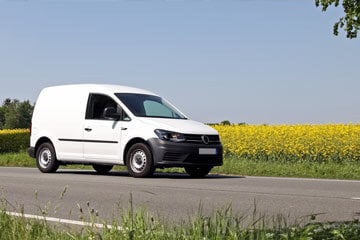"If you're insuring more than one van you should consider getting a multi van policy. It's a great way to save both time and money! Make sure you still check the prices of individual quotes to get a better feel for how much you should be paying."
Who needs multi-van insurance?
Anyone with multiple vans could benefit from this type of policy. It doesn’t matter if you’re running a business or using the vans personally. Here are some examples of who might find multi-van insurance useful:
- A business owner with delivery vans.
- A tradesperson who uses different vans for different jobs.
A family with multiple vans for personal use
What's the difference between multi-van and fleet van insurance?
Generally, multi-van insurance can be useful for smaller setups, like families or small businesses. Fleet insurance, on the other hand, is aimed at businesses managing lots of vehicles.
Benefits of multi-van policies
Here are some of the many benefits you could get from having a multi-van policy:
- Potential cost saving
- Time-saving
Having all your vans under one policy might be cheaper than buying seperate single policies.
Having one policy might also save your time on things like paperwork and admin.
- Simplified renewals
- Customisable
One policy, one date—no more juggling multiple reminders.
Most insurers allow you to choose the cover and add-ons that suit your specific needs.
Types of cover available for your policy
Third party only
Third-party, fire and theft
Comprehensive
Additional features and add-ons for a mutli van policy
Here's some optional add-ons can be bolted onto your multi-van policy:
- Breakdown cover:
- Legal expenses cover:
- Driving abroad cover:
For when your van decides to call it a day.
This helps to cover legal fees so you're not out of pocket.
This may come in handy if you have any European trips planned.
- Courtesy van cover:
- Windscreen cover:
- Personal effects cover:
This will help keep you on the road even if your van’s in the garage.
Peace of mind that you're covered for any chips or cracks
Protect the belongings that you carry in your van against loss or damage, for exmaple, tools.
Will a multi-van policy be cheaper?
The short answer? It could be! Insuring multiple vans under one policy often costs less than separate ones. That said, the cost will depend on things like the size of your vans and how you use them.
Can the price of van insurance depend on who's driving?
How much you’ll pay for your insurance very much depends on who's driving. Here’s what insurers look at:
- Age: Younger drivers tend to cost more to insure due to having less experience.
- Convictions: Points or bans can hike up your premiums, compared to people who have a clean record.
- No-claims discount: If you have never claimed on your car insurance before, you could get a discount.
- Number of drivers: Adding more people can increase the cost.
- Experience: The more experienced the driver, the less insurers perceive you as a risk.
- Licence type: Full licences usually mean lower premiums compared to those on a provisional or automatic only licence holders.
- Profession: Some jobs are seen as higher risk, for example, fast food delivery drivers and delivery couriers.
Top tips to reduce policy cost
These handy tips could help you to save money on your multi-van insurance.
- Increase voluntary excess
- Park off street
- Improve van security
- Black box policy
- Not auto-renewing
- Compare quotes
Increasing how much voluntary excess you pay might reduce your premium. But you need to make sure that you would be able to afford this amount if anything happens and you need to make a claim.
Park your van somewhere off the street and secure overnight, so it's at less risk of being stolen or crashed into.
Improving the security of your van by adding things like alarms or steering locks can help to lower costs.
Telematics aka black box policies encourage safer driving, making you less of a risk. Insurers may reward safer driving with discounts.
Shop around to make sure you're getting the best deal for your specific needs.
Always look for the best price before committing, as prices can vary among insurers.








